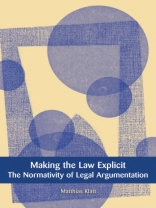Legal argumentation consists in the interpretation of texts. Therefore, it has a natural connection to the philosophy of language. Central issues of this connection, however, lack a clear answer. For instance, how much freedom do judges have in applying the law? How are the literal and the purposive approaches related to one another? How can we distinguish between applying the law and making the law?
This book provides answers by means of a complex and detailed theory of literal meaning. A new legal method is introduced, namely the further development of the law. It is so far unknown in Anglo-American jurisprudence, but it is shown that this new method helps in solving some of the most crucial puzzles in jurisprudence.
At its centre the book addresses legal indeterminism and refutes linguistic-philosophical reasons for indeterminacy. It spells out the normative character of interpretation as emphasized by Raz and, with the help of Robert Brandom »s normative pragmatics, it is shown that the relativism of interpretation from a normative perspective does not at all justify scepticism. On the contrary, it supports the claim that legal argumentation can be objective, and maintains that statements on the meaning of a statute can be right or wrong, and take on inter-subjective validity accordingly.
This book breaks new ground in transferring Brandom »s philosophy to legal theoretical problems and presents an original and exciting analysis of the semantic argument in legal argumentation. It was the recipient of the European Award for Legal Theory in 2002.
»This book represents, on the one hand, a reception of Robert Brandom »s important theory including applications of this theory in the field of legal philosophy and, on the other, an exploration of the limits of an appeal in legal interpretation to the text. The enquiry thereby impinges upon the central juridico-philosophical themes of meaning, objectivity, and normativity. The author »s work counts as a significant contribution to analytical jurisprudence and is deserving of a wide readership. » Robert Alexy, Professor for Public Law and Legal Philosophy, Kiel.
»Klatt focuses on a very profound theory of concept formation and uses this theory in a creative way to solve classical problems of legal argumentation. » Aleksander Peczenik
Univ.-Prof. Dr. iur. Matthias Klatt
Making the Law Explicit [PDF ebook]
The Normativity of Legal Argumentation
Making the Law Explicit [PDF ebook]
The Normativity of Legal Argumentation
Achetez cet ebook et obtenez-en 1 de plus GRATUITEMENT !
Format PDF ● Pages 256 ● ISBN 9781847314567 ● Maison d’édition Bloomsbury Publishing ● Publié 2008 ● Téléchargeable 3 fois ● Devise EUR ● ID 5766590 ● Protection contre la copie Adobe DRM
Nécessite un lecteur de livre électronique compatible DRM












